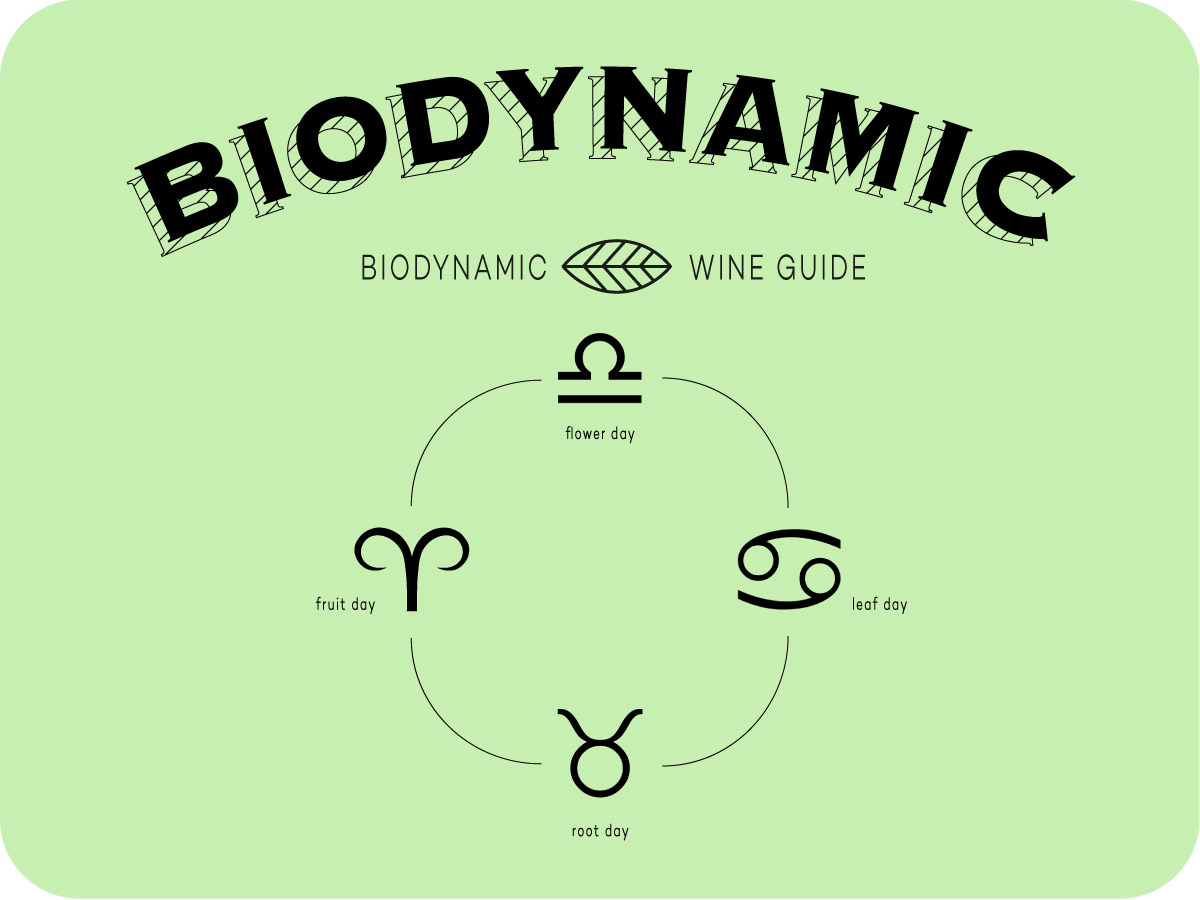What exactly is Biodynamic Wine? This completely organic wine is great and somewhat odd. Find out about biodynamic wines including how they’re made and how they taste.
A Guide To Biodynamic Wine

Some call it “Hippie, dippy, wacky commune back to the Earth zeitgeist” while proponents claim that it permits the only true expression of terroir. Are biodynamic wines really about celestial energy, cow horns and howling at the moon? To quote Mike Benziger, whose vineyards were the first to be certified biodynamic in Sonoma County, CA:
“At its core, Biodynamics is an energy management system.”
–Mike Benziger, Benziger Family Vineyards
What Does Biodynamic Mean?
The concept behind biodynamics is that everything in the universe is interconnected and gives off a resonance or ‘vibe’. The interconnectivity of everything even includes celestial bodies like the moon, planets and stars. Biodynamic viticulture is the practice of balancing this resonance between vine, man, earth and stars. Essentially, biodynamics is a holistic view of agriculture.
Biodynamic Agriculture is Almost a Century Old
The concept of Biodynamics started in the 1920’s with an Austrian philosopher named Rudolph Steiner. It is a holistic, homeopathic manner of farming that, of course, also includes viticulture. It is the oldest, anti-chemical agricultural movement that predates the creation of organic farming by about twenty years.
If you think about it, there’s not really anything ‘new’ behind the theory of biodynamics. Mankind has looked to the celestial sky for guidance from the ancient Greeks and Egyptians all the way to the trusty ‘Farmer’s Almanac’ which is the bible of traditional American farming.
What Makes Wine Biodynamic?

The ‘Demeter’ symbol represents one of only two Biodynamic Certifications in the world.
Biodynamics occur primarily in the vineyard before winemaking even happens. All the various tasks, from planting, pruning, to harvesting, are regulated by a special biodynamic calendar. The calendar was originally devised by the ‘high priestess’ of Biodynamics, Maria Thun, who divided days into four categories: Root, Fruit, Flower and Leaf Days.
Each biodynamic calendar day coincides with one of the four classical elements of Earth, Fire, Air and Water that have been used since before Plato’s era:
- Fruit Days: Best days for harvesting grapes
- Root Days: Ideal days for pruning
- Flower Days: Leave the vineyard alone on these days
- Leaf Days: Ideal days for watering plants
You would never, for example, want to harvest on a Leaf Day because Leaf Days correlate with the Element water and you’d end up picking rotten, waterlogged grapes!
Besides the biodynamic calendar, no chemicals or ‘manufactured’ additions (like commercial yeast) are allowed in biodynamic wine. Instead, wine growers make special compost preparations with natural ingredients to bolster their vineyards. This is where things start to get controversial.
How to Find Biodynamic Wines
Biodynamic wines must be certified. The strict rules and regulations are overseen by 2 governing bodies:
- Demeter International provides a resource of their Demeter Biodynamic Wines (Access the list by selecting “Processed Product” —> “Wine”)
- Biodyvin certifies only 100 European wineries. Biodyvin Biodynamic Wines
Do Biodynamic Wines Taste Different?
No.
Although a few biodynamic producers make a different style of wine that focuses more on the ‘Secondary Flavors’ (ie yeast flavors). However, you might be surprised to recognize a few of these famous wine producers who make Biodynamic wine and they do not taste any differently than what you might already be used to:
- Bonny Doon Red & White wines from the Santa Cruz Mountains, CA
- Benziger Family Winery Red & White wines from Sonoma, CA
- Bonterra Vineyards by Fetzer Winery Red wines from Mendocino County, CA
- Michel Chapoutier Red & White wines from the Rhône Valley, France
- Nicolas Joly White wines from the Loire Valley, France –one of the earliest converts
- Domaine LeRoy Red & White wines from Burgundy, France
- Cristal Champagne by Louis Roederer Champagne, France
- Domaine Zind-Humbrecht Aromatic white wines from Alsace, France
You can find biodynamic wines in United States, France, Germany, Spain, Italy, Eastern Europe, Chile, Argentina, India and Australia. Those who believe in the philosophy think that the wines are more characteristic to the ‘terroir’ where they originate. The wines are often described as balanced and age equally as long as ‘standard’ wines.
Biodynamic Composting Is Bizarre

The fall ‘preparations’ at Zinniker Farms, WI , biodynamic since 1943. by Thea Maria
“Cow horns are stuffed with special compost preparations. After being buried for a time, the contents are used to make a ‘tea’ for fertilizing the vineyard.”
True biodynamic farming will actually make vegetarians cringe. Biodynamic viticulture requires special compost preparations that are stuffed into cow horns and buried in the soil. Later, the cow horns are dug up and reused and the ’stuffing’ is distributed throughout the vineyard.

There are nine compost preparations used in Biodynamic farming which include everything from manure and cow horns to yarrow blossoms (mentioned in Homer’s Illiad for treating wounds), chamomile (a natural antiseptic) and stinging nettles (a natural cleanser). Of course, there is no serious evidence on whether or not cow horns are a truly necessary component in what is ultimately a dedicated organic gardening process.

Drink Wine on ‘Fruit Days’
You can actually extend the idea of biodynamics into your own drinking! Schedule your serious wine tastings on either flower days or fruit days.
Is Today a Fruit Day?
Sources
Biodynamic soils tested better than conventional soils (pdf)